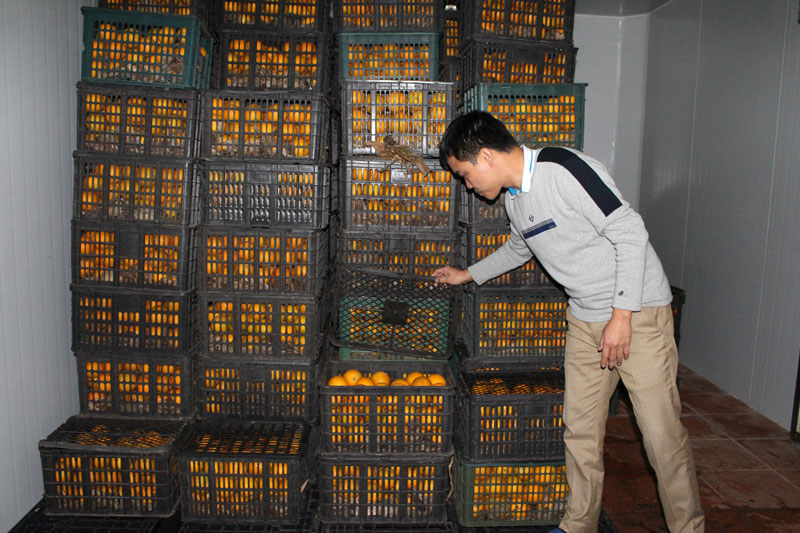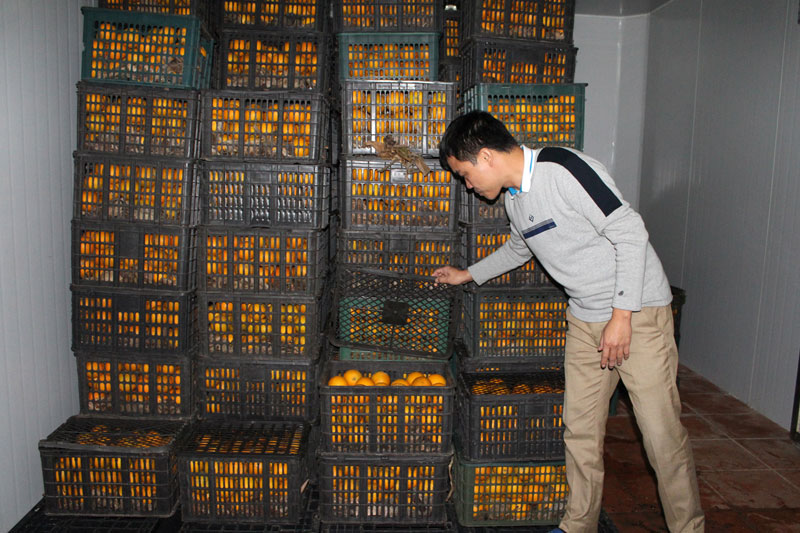
(HBO) – This year, the market price for Cao Phong orange ranges from 17,000 VND to 22,000 VND per kilo. Meanwhile, with the price of 20,000 VND per kilo, Ha Phong Cooperative’s supply of 2.5 tonnes per day to the Big C supermarket system is making many orange farm owners jealous.
Le Van Cuong, Director of Ha Phong cooperative in Mon
village, Bac Phong commune, said that the cooperative was established and put
into operation in 2016. Up to now, the cooperative has 10 members managing 144 hectares
of the fruit. This is the area contributed by members in the cooperative which
is specialised in buying, preserving, preliminary processing and selling of
orange products to the domestic market.
Recently, the cooperative has participated in the
project to "support the cultivation and consumption of Cao Phong orange in
the direction of quality certification improvement and brand management"
launched by the district People's Committee. The project aims to give a number
of support policies for the formation of cultivation and selling chain of Cao
Phong orange to ensure food safety with consumption chain spanning from growers
to consumers. Thanks to the policies, in 2017 and 2018, the cooperative secured
consumption contracts with the Big C supermarket system. Under the contracts, from
October 15, 2018, every day, the cooperative supplies the system with 2.5 tonnes
of orange with a price fixed at 20,000 VND per kilo.

Ha Phong cooperative invests in cold storage system for
preserving orange fruits before selling to the market.
like Ha Phong cooperative, Hung Phong company, based
in Zone 2, Cao Phong town, has become a major consumer of orange in Tan Phong,
Thu Phong, Dung Phong, Nam Phong, Bac Phong, Dong Phong communes and
surrounding areas.
According to statistics, by 2018, Cao Phong district
has 3,056.2 hectares of orange, with 61 hectares planted in 2018. Of this, the
area with commercial yield covers 1,589.3 hectares, and that of the development
stage, 1,407.7 hectares. Particularly, among the nearly 1,600 hectares of yielding
farms, nearly 800 hectares have been granted VietGAP certificates. It is
estimated that Cao Phong's orange output will reach 35,000 tonnes in the 2018 –
2019 crop. By now, thanks to good promotion and communications, Cao Phong
orange products have become popular among domestic consumers and entered the top
10 brands in Vietnam./.
According to data from the Hoa Binh Provincial Party Committee, the industrial production index for the first six months of 2025 is estimated to have increased by 20% compared to the same period last year. This marks the highest year-on-year growth rate for this period since 2020.
In the first six months of 2025, Hoa Binh province’s export turnover was estimated at 1.145 billion USD, marking an 18.11% increase compared to the same period in 2024. Import turnover was estimated at $ 804 million, a 17.15% increase, which helped the province maintain a positive trade balance.
The lives of the ethnic minority farmers in Tan Lac district have gradually improved thanks to the new directions in agricultural production. This is a testament to the collective strength fostered through the professional associations and groups implemented by various levels of the district’s Farmers’ Union.
With the motto the "product quality comes first,” after nearly one year of establishment and operation, Muong village’s Clean Food Agricultural and Commercial Cooperative, located in Cau Hamlet, Hung Son Commune (Kim Boi district), has launched reputable, high-quality agricultural products to the market that are well-received by consumers. The products such as Muong village’s pork sausage, salt-cured chicken, and salt-cured pork hocks have gradually carved out a place in the market and they are on the path to obtaining the OCOP certification.
In the past, the phrase "bumper harvest, rock-bottom prices" was a familiar refrain for Vietnamese farmers engaged in fragmented, small-scale agriculture. But today, a new spirit is emerging across rural areas of Hoa Binh province - one of collaboration, organisation, and collective economic models that provide a stable foundation for production.
Maintaining growing area codes and packing facility codes in accordance with regulations is a mandatory requirement for agricultural products to be eligible for export. Recently, the Department of Agriculture and Environment of Hoa Binh province has intensified technical supervision of designated farming areas and packing facilities to safeguard the "green passport" that enables its products to access international markets.



